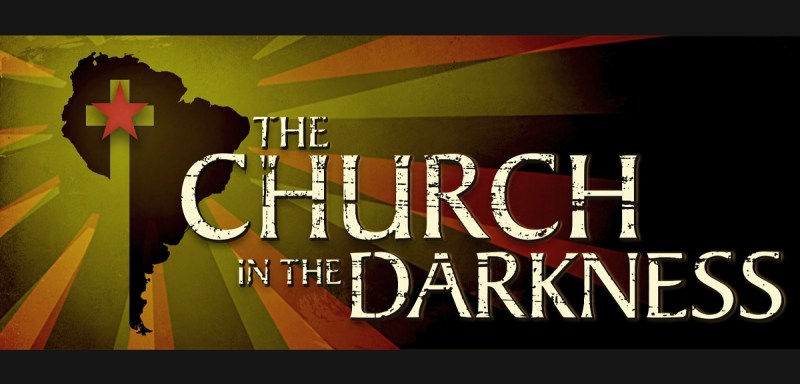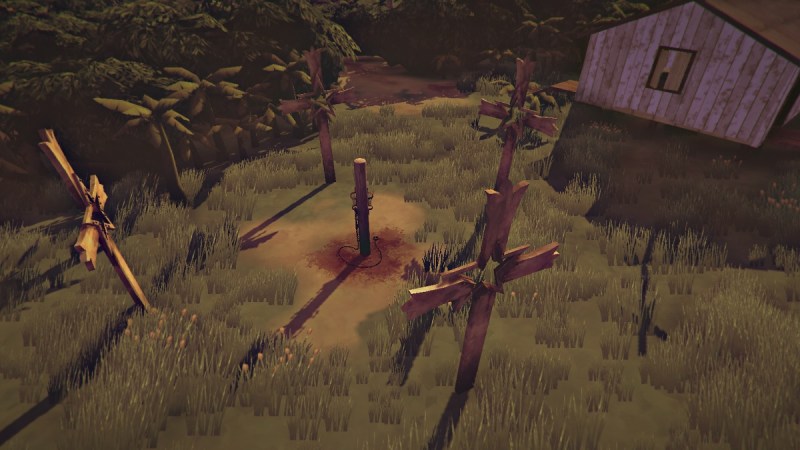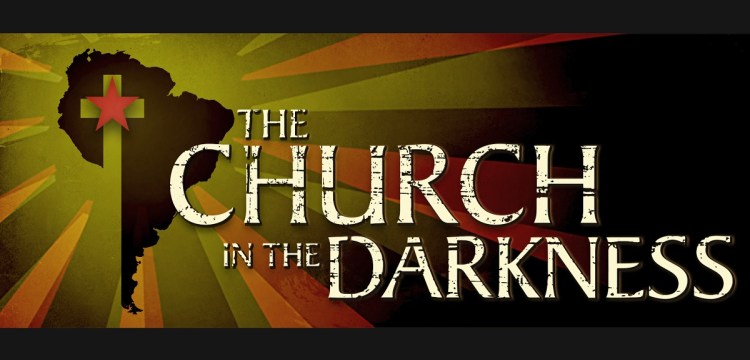South America for me was just fascinating, and that’s the bulk of the similarity to Jonestown you can find. It’s always been interesting in its relationship to North America. If you were a Nazi who wanted to hide out after the war, you went there. There are many different governments, and there have been a few countries that are corrupt enough that you can avoid whatever laws you like for the right amount of money. It’s fascinating to me as a place where people in the United States who wanted to do something different would go to in order to escape, to go back to nature or whatever it is. It’s a great place to set a game.
GamesBeat: Can you explain more about the background of the cult?
Rouse: The cult leaders are played by two voice actors that people like. The characters are Isaac and Rebecca Walker, a couple in their 40s, who have built this group up and moved them all down there. Isaac is played by someone I’d worked with before on The Suffering, the horror games I did years ago, this guy called John Patrick Lowrie. He’s a Seattle actor. He’s been in all of Valve’s games. He’s a bunch of characters in DOTA, and he’s the sniper in Team Fortress 2. And then his real-life wife is Ellen McLain, who is GladOS in Portal and characters in DOTA and so on. She plays Rebecca, the other cult leader.
They’re really acting together in a game for the first time. They’ve done all of these games, but they’ve never really been—she’s off doing Portal stuff, and then there’s no male lead opposite GladOS. I’ve known John and wanted to work with him. He was one of the first people I told about the game when I was thinking about doing it, because I knew he’d be great for the part, even before I’d written it or fleshed it out at all.
June 5th: The AI Audit in NYC
Join us next week in NYC to engage with top executive leaders, delving into strategies for auditing AI models to ensure fairness, optimal performance, and ethical compliance across diverse organizations. Secure your attendance for this exclusive invite-only event.
They’re older folks than I am, so they were—John was a traveling hippie musician in the ‘70s. He was alive during the period. They’ve been great to collaborate with on the script and the characters, figuring things out. Would he say this? Would she say that? What did people think about this at the time? They’ve been a great source of further input for the game and building these characters out.
They’ve also done a bunch of original songs for the game. We have a soundtrack with nine songs from them. Five of them are originals and then four of them are classic spirituals. Ellen is a trained opera singer and John was a sort of folk musician, and then he’s sung in a lot of theater, musicals and things like that. He was also a songwriter in the ‘70s, when he toured as a folk musician.
I had thought about having someone else write songs, and then I heard something John had written and I talked to him – “Hey, would you want to try this?” The first thing he sent me was something called “The Song of Forgiveness.” We were fairly far into the project at this point, so he was aware of the characters and what was going on in the world. I had assumed I would have to give him notes on the songs, or work on the lyrics with him, but he just wrote something right off and I said, “That works great.” They’ve been great collaborators on that front.

Above: The Church in the Darkness
GamesBeat: In some ways it’s a difficult topic. I wonder how you can say to the player that they’re going to have fun exploring this. It reminds me of when I first heard about Prison Architect. “I’m going to have fun with this?” How did you approach that challenge.
Rouse: People’s reaction the setting, the cult, the narrative stuff we’re doing—people seem to be okay with that. There’s some amount of, “Oh, that sounds creepy and weird, I want to see that.” You go see a horror film, you’re not thinking it’s going to be fun. You think it’s going to be freaky or whatever it is. There’s some amount of attraction like that getting people in.
It can be tricky, and I think indie games over the last decade have shown – including Prison Architect – that you can take that chance and go somewhere that doesn’t immediately seem like a romp and a good time. If you have a strong story in there, if you have strong game mechanics in there, players will come along wanting to see these different worlds, wanting to get a taste of it. There are certainly plenty of indie titles–Papers Please is a game I like a lot, and that’s not a lot of fun. It can be pretty crushing.
We’re trying to be a little more—again, we’re not defining what “good” is, but there are endings where players can feel like they made a difference in any permutation of the cult. They can overcome the problems there and solve things not just for their nephew, but for everybody there. Players can also play the game completely as a pacifist, too. They can kill no one, everywhere from avoiding detection to just using non-lethal methods to get through problems. We’re trying to give that space where the possibility of a happier ending in any scenario.
It’s not quite so bleak and depressing as something like Papers Please can be. That’s not to say that I don’t think people should make games like that. I think there’s a space for that. People find value in games like that. They’re compelling. Part of the advantage of being an indie is being able to do something that doesn’t necessarily immediately sounds like fun and see if we can make it engaging.
GamesBeat: Are there any other games that have tackled this kind of subject, besides Far Cry?
Rouse: People usually bring up—there are a few different definitions. You have a cult in the Cthulhu sense, and there are a bunch of games like that, everything from Dark Corners of the Earth to Resident Evil 4. You have indie games like The Shrouded Isle, that came out last year. That’s very much a Cthulhu, sacrificing people to the gods sort of game, which is cool, but obviously very different.
GamesBeat: More of a horror game.
Rouse: Right. Mostly horror, mostly period, fantasy sorts of things. Many of the factions in the Fallout games feel like cults, because they’re all worshipping an unexploded nuclear bomb and other weird stuff. I like to point out that BioShock 2 felt like it had some culty stuff going on in it, with Sophia Lamb, the villain in that piece. But it didn’t feel like a cult game. It still felt like a BioShock game, an extension of that.
Even in a game I did—I started out doing indie games, 20 years ago, although we didn’t call them indie back then. The second game I made was called Damage Incorporated, a first-person shooter with a military thing where you could command a squad. We were working on it before the original Rainbow Six came out, and then Rainbow Six came out while we were working. There’s Ubisoft again, although it wasn’t Ubisoft yet. [laughs] But Damage Incorporated, one of the enemy factions in that was a cult. You were going into their compound in American somewhere, where they wore crazy robes and had flamethrowers. It was a much more campy, over the top sort of thing.
It feels like this has come up in a lot of games, but it’s never really treated in a serious way. It’s more like, “We need some enemies. They could be in a cult. Let’s do that.” They do interesting things with that, but it’s usually not the reason for the game existing.

Above: The Church in the Darkness
GamesBeat: Immersion in the story seems like a lot of the appeal here. You can take somebody to a very different world and experience let them make difficult choices there.
Rouse: Right. There is a sort of bedrock of—it plays like old Metal Gear, or the original Castle Wolfenstein from the ‘80s, one of my favorite games. It has core game mechanics that people will recognize and enjoy. We’re still tuning them. You have that. But yes, I think for most people coming in, it’s going to be about wanting to see this world, see how it’s different than what they expected, and also—again, I think what we have feels like a real group. Some of the best feedback I’ve gotten from people is like, “You’ve really nailed the tone.”
This isn’t a conventional storytelling game. There aren’t long cutscenes or signposted bits of action that have to happen every time. It’s really more simulation. You’re getting the narrative while you play. I try to never pull people out of playing the core game, while still giving them—you hear the cult leaders talk over the PA system the whole time. You get a lot of your narrative that way. You find documents in desks that you read. They’re everything from maps to find things in the camp to correspondence home from the members to discipline reports about Alex, your nephew, that might give you a sense of whether he’s happy there or not.
We’re trying to work in the narrative in a way that feels like, going back to—if I was coming into this group from the outside, how would I learn stuff? I’d learn by observing what’s going on in the world, seeing scenes like people around a gravesite. There are a lot of cages in the game, where people are locked up for punishment. That seems creepy, but maybe it’s not that bad? Different characters, as you find these documents, will be debating whether that’s good or not, how they’re carrying out punishments. It’s trying to put the player in the world and ask, “What do you want to do?”
GamesBeat: What more do you feel you have to do? Do you have a complete game now that you’re iterating on, or do you have features to finish still?
Rouse: We’ve just gotten to a full build of the game. You can play from start to finish and get all the different endings. There are so many endings, so many variations, that I haven’t even played them all. I’ve gotten some trusted friends, other developers, to check the game out now and see if they’re figuring it out. What are they missing? What are they not missing? What can we improve? We’re in a sort of alpha-beta polishing state. Just trying to get all those pieces together, and then a few last pieces of content that are coming in. They’re done, but they aren’t in the game yet.
What we’ve been showing at places like GDC or PAX is usually a little slice of the game. It’s not the full build. We don’t want to spoil it in a trade show environment. There we’ve created something that’s a little more linear. The full game is much more of an open world experience.

Above: This isn’t a happy cult.
GamesBeat: How are you getting it out there?
Rouse: We’ve announced for PC, on Steam, as well as PS4 and Xbox One. We haven’t announced if they’re all shipping or not. It’s self-published. We haven’t announced a price, but it’s going to be an indie price. [laughs] It’s not a $60 game.
id@Xbox had us in their showcase at the last GDC. You’ve probably been to their event, a few blocks away from their convention center. They had a day of games in the id@Xbox program. PlayStation, they’ve taken us to PlayStation Experience a couple of times. Both have been pretty good to work with. I don’t need to get into too much inside baseball about that, but it’s good that they’ve been open to this type of game. It’s been very encouraging to me.
GamesBeat: Are you doing any kind of early access?
Rouse: No, we’re not planning to do early access. As a narrative game—my impression of early access is it’s great for games that are multiplayer, or games where you really want to play for six months to a year. The worst scenario with early access, as a player—you get in, you play the build, it’s kind of broken, or it’s not complete, and then you think, “Oh, I’ll come back to that later” and you never do. Your online impression that’s left is from this version that’s not really done. That works for Rocket League or something like that, where you’re going to keep playing and it keeps getting better.
For something like this, even though it’s a simulation game and designed to be replayed many times to experience all the different parts of the narrative, I always fear that someone playing an incomplete version – where not all the endings work, or where certain characters are missing – I just feel like all those parts need to be there for it to come together.


